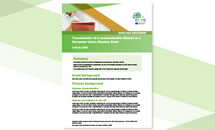Rapid risk assessment: Autochthonous cases of dengue in Spain and France
Three autochthonous cases of dengue have been reported in France and Spain. The probability of further local sustained transmission remains very low, both in Spain and in France. Environmental conditions will become progressively less suitable for transmission over the autumn season.
Executive Summary
On 16 September 2019, the Catalonian Public Health Agency confirmed an autochthonous case of dengue in a resident of Barcelonès county in Catalonia, Spain. The case had onset of symptoms on 6 September 2019, with no recent travel history outside of Spain. Dengue infection was confirmed by the Catalan reference laboratory for arboviruses and the Spanish national reference laboratory for arboviruses. Epidemiological investigations in Catalonia are ongoing, and further cases may be detected. According to national authorities, control measures are being implemented.
On 20 September 2019, the regional public health agency of Provence-Alpes-Côte d’Azur region reported a locally acquired confirmed case of dengue in a resident of the city of Vallauris in the department of Alpes-Maritimes. The case had onset of symptoms on 30 August and did not report any recent travel history outside of mainland France. This case was laboratory-confirmed by the French National Reference Centre for Arboviruses (NRC, Marseille). Door-to-door active case finding was implemented around the home of the autochthonous case on 19 September. Four additional cases in the direct vicinity were identified.
In addition, the regional public health agency of Auvergne-Rhône-Alpes reported a locally acquired probable dengue case in a resident of Caluire-et-Cuire − a suburban area of the city of Lyon − in the Rhône department. The case had onset of symptoms on 14 July 2019. For this case, NRC laboratory confirmation is still pending. The case did not report any recent travel outside of mainland France.
To date, these three events should be considered as independent because epidemiological investigations could not identify any epidemiological links between them.
Based on previous observations of autochthonous arbovirus transmission during the past decade, namely dengue and chikungunya, reports of sporadic autochthonous cases or limited clusters of dengue are expected in the Mediterranean region and southern parts of EU/EEA countries in the summer and autumn due to the presence of established populations of a competent vector (Ae. albopictus ) and a large volume of travel-associated cases returning from epidemic/endemic tropical and subtropical countries favouring the introduction of dengue or chikungunya viruses.
The probability of further local sustained transmission remains very low, both in Spain and in France. Environmental conditions will become progressively less suitable for transmission over the autumn season. To date and based on ECDC’s epidemiological assessment, the risk that visitors to the affected area will become infected and subsequently introduce the virus and thus initiate further local transmission in their country of residence cannot be excluded, but remains very low.
Download





